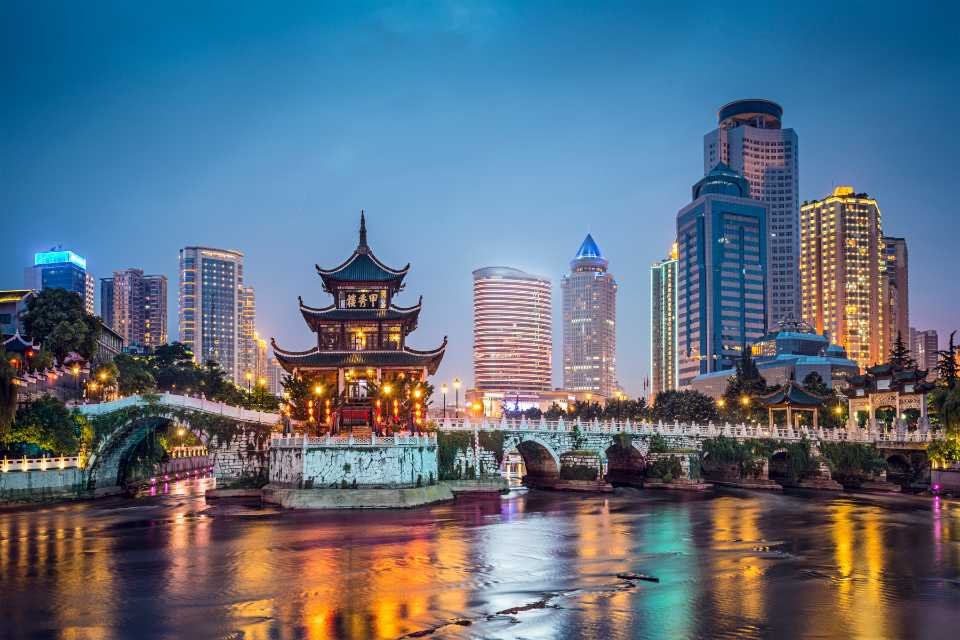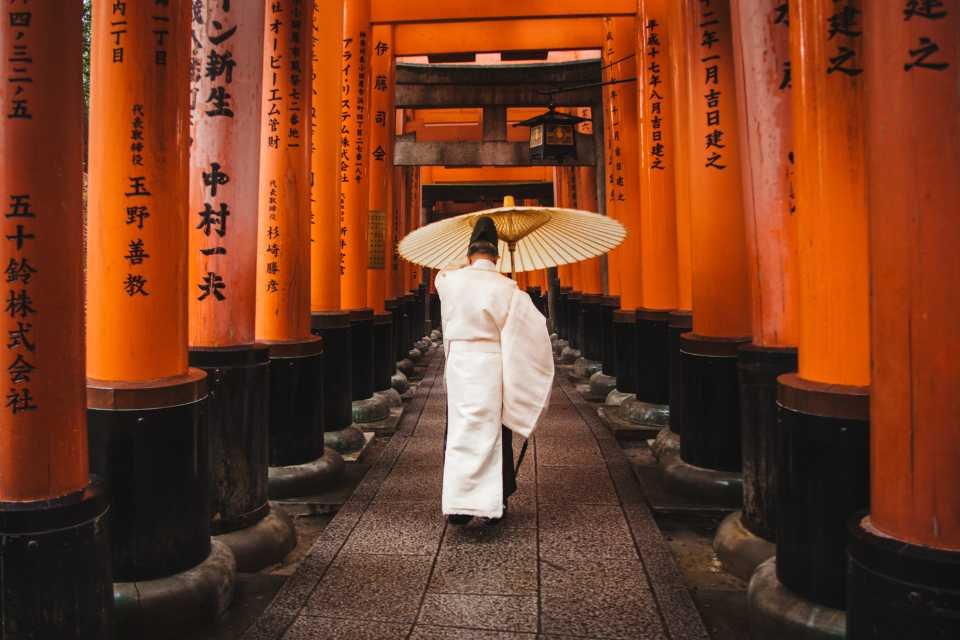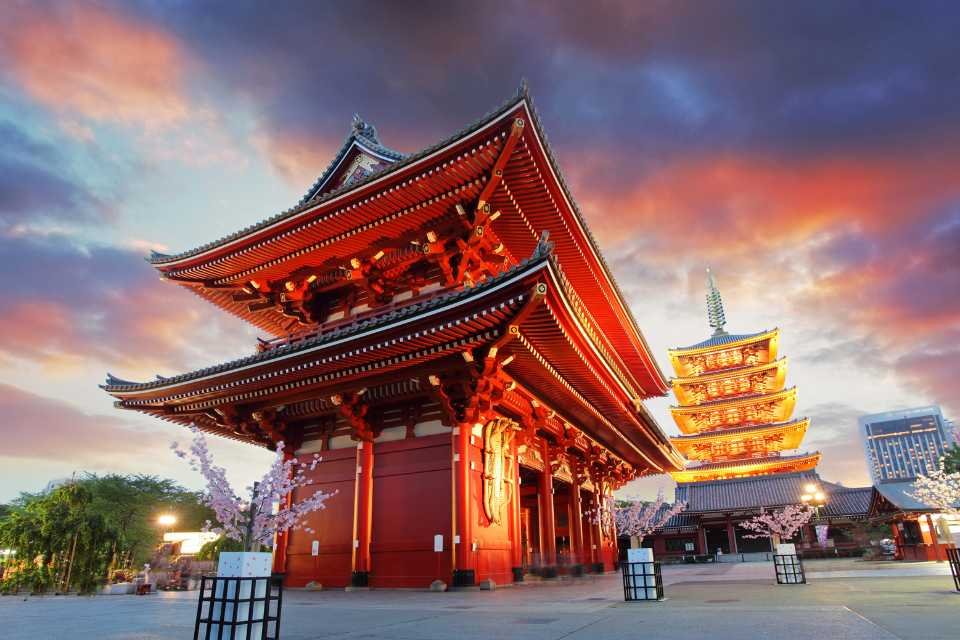The Ultimate China Travel Guide
Everything you need to know about visiting China
China is an incredible country full of fascinating culture and beautiful scenery. From the hustle and bustle of the cities to the serenity of the countryside, it's a must-visit for any traveler looking for an adventure.
But before you go, it's important to know the best way to explore the country like a local. In this ultimate China travel guide, we'll provide you with all the tips and tricks you need to make the most of your trip. From getting around to finding the best food, we'll show you how to experience China just like the locals do.
China is an incredibly diverse country, and if you're thinking of taking a trip there, you'll want to make sure you have the best possible experience. That's why we've put together this ultimate China travel guide.
Our guide will show you how to see the country like a local, giving you access to authentic experiences, unique insights, and all the best places to visit. So read on to find out how you can make the most of your time in China!
About China
China is a vast and ancient country located in East Asia. It has a long and fascinating history, which dates back to the 3rd century BC. China is home to some of the world’s oldest civilizations and is full of unique culture and customs.
China is the world’s most populous nation, with a population of over 1.4 billion people. It covers an area of approximately 9.6 million square kilometers and is one of the most geographically diverse countries in the world. Its terrain ranges from mountainous regions in the south to deserts and grasslands in the north.
The official language in China is Mandarin Chinese, but many other languages are spoken in different parts of the country, including Cantonese and Tibetan.
China has a rich tradition of art and literature, including painting, calligraphy, music, poetry, and martial arts. It is also known for its traditional Chinese architecture and beautiful gardens.
In recent years, China has become an economic powerhouse and its economy is now the second largest in the world. As a result, it has attracted millions of tourists every year. Whether you’re looking for ancient ruins or modern cities, China offers something for everyone.
When to Visit
When it comes to planning your trip to China, there is no one-size-fits-all answer to the question of when to visit. Depending on your travel style, budget, and interests, the perfect time to visit China can vary greatly.
If you’re looking for the best climate and weather conditions, then visiting in the spring or fall are likely your best bet. The months of April through June tend to be the most popular due to pleasant temperatures, while the months of September through November also offer mild temperatures and fewer crowds.
If you’re looking to experience some of China’s unique festivals and cultural events, then certain times of year may be more ideal. The Mid-Autumn Festival, held in September or October, is a great time to visit for traditional Chinese festivities. Similarly, Chinese New Year, which falls between January and February, is celebrated with large celebrations throughout the country.
Lastly, if you’re looking for the best possible prices, then the winter months are typically the cheapest time to visit. While the temperatures can be quite cold, the flights and accommodation rates are much cheaper than in the peak seasons.
No matter what season you choose to visit, it’s important to plan ahead and take into account the climate and weather patterns of the region. By doing so, you can ensure that you have a truly unforgettable experience in China.
Annual events and unmissable experiences
China is a country full of vibrant and colorful festivals, events, and experiences that you won’t want to miss. Here are some of the top annual events and experiences that you should plan to experience while traveling in China.
Chinese New Year: This is the most important holiday in Chinese culture and takes place in January or February each year. People celebrate with family, friends, and fireworks. Be sure to attend one of the amazing parades or shows and get your hands on some traditional red envelopes filled with money!
Mid-Autumn Festival: This event is celebrated during the eighth lunar month and involves eating mooncakes, carrying lanterns, and watching fireworks displays. It is also a great time to visit China’s many temples and pagodas, as they are lit up with special decorations for the occasion.
Dragon Boat Festival: This traditional Chinese festival is held on the fifth day of the fifth lunar month and is celebrated with dragon boat races, eating zongzi (a sticky rice dumpling), and burning incense to honor Qu Yuan, a famous Chinese poet.
Labrador Festival: This festival honors the Labrador Retriever dog breed and is held in Yulin, Guangxi province. The festivities include dog competitions, performances, and a large banquet.
Qingming Festival: Also known as Tomb Sweeping Day, this holiday takes place around April 4th each year and is dedicated to honoring ancestors by visiting their graves and tidying them up. People also enjoy outdoor activities such as kite flying during this period.
Beijing International Film Festival: Held each April at Beijing's Chaoyang Park, this event features screenings of domestic and international films as well as various related activities. It’s a great opportunity to experience the world of Chinese cinema.
Harbin Ice and Snow Festival: This annual festival takes place from January 5 to February 28 in Harbin, Heilongjiang Province. It features sculptures made from ice, snow sports competitions, and other activities like sledding, skiing, and skating.
There are so many incredible events and experiences in China that will provide an unforgettable experience for travelers. Whether it’s celebrating Chinese New Year or watching the amazing ice sculptures at Harbin Ice and Snow Festival, be sure to check out these amazing annual events when visiting China!
Visa and passport requirements
Traveling to China from outside the country requires a valid visa. Depending on your nationality, there are different types of visas available. If you’re from the United States, you’ll need an L-visa for tourism and travel, or an F-visa if you are traveling for business. Other countries have their own requirements.
In addition to a valid visa, you must also possess a passport with at least six months of validity remaining and two blank pages. You will be asked to present your passport at customs, so make sure it is in order before you leave home.
When applying for your visa, you will likely need to provide evidence of sufficient funds, proof of onward travel, and details of any hotel bookings. If you’re traveling as part of a tour group, you may only need to provide your passport and photo. It’s important to check the visa requirements for your country before applying.
Before you depart for China, make sure to double-check that all your documents are in order. A valid visa and passport are essential for entry into the country, so make sure these are up-to-date and ready to go!
How to get to China
China is a huge country, but there are several ways to get here from other countries. Depending on where you are coming from, you may be able to find flights that are direct, or you may have to take a layover.
The main airports in China include Beijing Capital International Airport, Shanghai Pudong International Airport, Guangzhou Baiyun International Airport and Chengdu Shuangliu International Airport.
If you are travelling from North America, your best bet is to look for flights from Vancouver, Toronto, or Los Angeles to one of the major airports in China. From Europe, you can look for direct flights from cities like London, Paris, or Moscow.
It’s also possible to take a train into China from Russia or Mongolia. You’ll need to take an overnight train if you’re travelling from these countries. The Trans-Siberian Railway and the Trans-Mongolian Railway are two options for taking the train into China.
Once you arrive in China, it’s easy to travel around by plane, train, or bus. For longer journeys, taking the train is usually the most convenient and comfortable option.
No matter how you choose to get to China, it’s sure to be an adventure that you won’t forget!
Where to Go
When visiting China, there are plenty of places to explore and see. Whether you’re looking for cultural sites, natural wonders or bustling cities, there is something for everyone.
If you’re looking to experience the culture, then start your journey in Beijing. This capital city is home to iconic attractions such as the Great Wall of China, the Forbidden City, Tiananmen Square and the Summer Palace. Don’t miss out on a visit to the Temple of Heaven either, where emperors would pray for good harvests.
For those looking for beautiful natural scenery, head to Guilin, in the south of China. Here you can find breathtaking mountains, rivers and caves that will take your breath away. The most popular attraction in Guilin is the Li River Cruise, which takes you through the karst landscape and gives you an insight into rural Chinese life.
Another must-visit city is Xi'an, famous for its incredible Terracotta Army. Here you can also find the City Wall and the Great Mosque, both of which are perfect for strolling around.
For those looking for something a bit different, why not visit the spectacular Yellow Mountains? This area is home to some of China’s most stunning peaks, and offers visitors a variety of activities, such as trekking and hot springs.
Finally, if you want to get away from it all, why not go to Yangshuo? This quiet town has become popular among travelers due to its peaceful atmosphere and stunning views of limestone hills. You can also explore its many caves, villages and markets.
With so much to explore, it’s no wonder that China has become one of the world’s top travel destinations. Whether you’re looking for a vibrant city or a peaceful retreat, there is something for everyone in this amazing country.
What to Pack
When traveling to China, it's important to bring the right items so you can make the most of your trip. Here is a list of must-have items to pack for your journey to China:
Clothing: China has a range of climates and weather, so be sure to pack clothing that is appropriate for each season. Layering is key in both the winter and summer months, as temperatures can change quickly. Don’t forget to pack a raincoat and an umbrella, as well as something warm for cold days.
Footwear: Comfortable walking shoes are essential for exploring the cities, hills and countryside in China. You’ll also want to bring a pair of sandals or flip flops for use in public places such as hotels and public baths.
Toiletries: Be sure to bring all the toiletries you need for your stay in China, including soap, shampoo, toothpaste, sunscreen, insect repellent and any other personal hygiene products you may require.
Essentials: Bring a power adapter and converter set to ensure that your electronic devices work properly while you’re in China. You should also pack a small first-aid kit with over-the-counter medication, bandages and antiseptic wipes.
Don't forget your passport, visa, travel insurance card and other important documents. With these items in tow, you'll be ready to enjoy all that China has to offer!
How to Get Around
When it comes to exploring China, there are plenty of options for getting around. You can choose to travel by train, bus, taxi, or bike, depending on what fits your needs best.
Trains: Trains are the most popular way to travel within China. The country has one of the most extensive railway networks in the world, making it easy to get from point A to point B quickly and reliably. The trains are usually comfortable and spacious, and offer amenities such as wifi and dining cars.
Buses: Bus travel is an economical option for short-distance trips. Buses are usually cheaper than trains, but may take longer due to traffic or unexpected delays.
Taxis: Taxis are a convenient option for traveling within cities. They are typically easy to find, and can be hailed from the street or ordered via app. However, taxi fares can add up quickly, so it’s best to compare prices before taking a taxi.
Bikes: Biking is a great way to explore smaller towns and cities in China. There are plenty of places to rent bikes, and many Chinese cities have bike-sharing programs available as well. Just make sure you’re familiar with the local traffic rules and wear a helmet.
Chinese Customs and Etiquette
Understanding Chinese customs and etiquette is an important part of travelling to China. Being aware of what is expected of you when in the country can make your trip a much more enjoyable experience.
The most important thing to remember when it comes to etiquette in China is to respect their culture and traditions. This means being polite, courteous and avoiding confrontation.
It is also important to be aware of proper body language when in China. To show respect, it is customary to bow slightly and never point your finger at someone. It is considered rude to touch someone without permission.
When entering a Chinese home or restaurant, it is important to take off your shoes and leave them at the door. Also, it is polite to accept any food or drinks that are offered to you, even if you do not wish to consume them.
In terms of conversation, avoid topics such as religion, politics and sex. Also, be aware that some words have different meanings in Chinese than they do in English.
Finally, it is polite to exchange gifts in China and this can be anything from food to small trinkets. Before giving a gift, make sure that you know what is appropriate for the occasion and avoid giving sharp objects or clocks as these are considered bad luck.
The 10 must-see things in China
The Great Wall of China
The Great Wall of China is one of the most iconic sights in the world, and the only man-made structure visible from space. Stretching over 21,000 km, it is a must-see for anyone visiting China.
The Forbidden City
Located in Beijing, this vast palace was the imperial palace of the Ming and Qing dynasties and has been meticulously preserved as a museum.
Terracotta Army
In 1974, more than 8,000 terracotta warriors were discovered in Xian. This incredible archaeological find is considered to be one of the greatest discoveries of the 20th century.
Li River
Known for its dramatic scenery, the Li River is considered to be one of the most beautiful rivers in the world. Visitors can take a boat trip down the river, which takes about four hours.
Shanghai Skyline
No trip to China is complete without a visit to Shanghai’s famous skyline, where some of the world’s tallest buildings and modern architecture abound.
The Summer Palace
This imperial garden in Beijing covers an area of 2.9 square kilometers and is filled with beautiful pavilions, temples, bridges and halls.
Giant Pandas
These lovable animals are native to China and can be seen in zoos or at special sanctuaries, such as the Chengdu Research Base of Giant Panda Breeding in Sichuan Province.
Jiuzhaigou Valley
Located in Sichuan province, this nature reserve is filled with colorful lakes, waterfalls and snow-capped peaks.
Yellow Mountains
Located in Anhui province, these mist-shrouded mountains are home to some of the most spectacular scenery in China, as well as a variety of temples and monasteries.
Hong Kong
This former British colony is now part of China but retains its own laws and culture. It is a vibrant and exciting city that features stunning skyline views and iconic attractions such as Victoria Peak and the Star Ferry.
Currency and money
When travelling to China, it’s important to understand the local currency and the best way to pay for items. The official currency of China is the Renminbi (RMB), which consists of Yuan, Jiao and Fen (also known as mao). Generally speaking, Yuan is used for larger purchases while Jiao and Fen are used for smaller ones.
When travelling, you will most likely have to use cash, but credit cards are accepted in many places. ATMs are widely available in major cities and tourist areas, however it is important to be aware that not all ATMs accept international cards. Before leaving home, it is a good idea to contact your bank to ensure that your card will be accepted at the ATMs in China.
It is also a good idea to exchange some cash before arriving in China as not all vendors accept credit cards. The most convenient place to exchange money is usually the airport, but it is usually more expensive than other exchange locations. If you are looking for a better rate, then consider changing money at a bank or large hotel.
Lastly, it is important to note that tipping is not common practice in China. You will find that service charges are often added to restaurant bills and taxi fares, so there is no need to leave extra money.
Chinese cities to visit
Beijing
As the capital of China, Beijing is a must-see destination. It’s home to iconic sights like the Forbidden City and Great Wall of China. Plus, it’s full of amazing street food and night markets.
Shanghai
The most populous city in the world, Shanghai is a modern metropolis with plenty of sights to explore. Don’t miss the old colonial architecture, iconic waterfront, and bustling markets.
Xi’an
Home to the terracotta warriors, Xi’an is the perfect place to get a sense of Chinese history. Its ancient city walls, Muslim Quarter, and numerous temples make it an essential stop on any tour of China.
Chengdu
This laid-back city is known for its delicious Sichuan cuisine, teahouses, and lively nightlife. Head to nearby Dujiangyan to explore one of the oldest irrigation systems in the world.
Guilin
Boasting some of China’s most dramatic landscapes, Guilin is great for outdoor lovers. Visit the picturesque Li River, or take a cruise down the river to admire the limestone karsts that rise from the water.
Hangzhou
Known for its incredible natural beauty, Hangzhou is home to the stunning West Lake. Relax by its shore or explore the many gardens and pagodas that line its banks.
Hong Kong
This vibrant city is full of attractions like museums, parks, and cultural sites. Plus, it offers some of the best shopping in Asia and a variety of delicious cuisine.
Yangshuo
Located just outside of Guilin, Yangshuo is a stunning mountain village that offers endless opportunities for outdoor exploration and adventure. Climb the nearby Moon Hill or go rafting down the Li River.
Macau
A former Portuguese colony, Macau combines Chinese and European influences in a unique way. Wander through its cobblestone streets, try your luck at the casinos, or sample some of its famous egg tarts.
Food and drinks in China
China is a country with a rich and diverse culinary culture. Whether you’re in the north or south, east or west, you’ll find something to tantalize your taste buds. From simple street food snacks to elaborate multi-course meals, you can find a wide variety of dishes to sample.
When it comes to beverages, China is well known for its tea. Tea has been consumed in China for centuries and there are many varieties to choose from, including green tea, oolong tea, and jasmine tea. Coffee has also become increasingly popular in recent years, with the growth of Starbucks and other international coffee chains in major cities.
In terms of alcoholic drinks, beer is a favorite among locals and tourists alike. The most popular beers include Tsingtao, Snow Beer, and Yanjing. Chinese baijiu is a spirit made from grains like rice, wheat, and sorghum that has been distilled for centuries. For a sweeter option, try a Chinese wine like Chateau Junding or Grace Vineyard's Silver Heights.
When dining out, be sure to ask about any additional fees that may not be included in the bill. Also, tipping is not common in China, so it's not expected or required. However, if the service was particularly good, it's polite to leave some money behind.
No matter what kind of food and drink you're looking for, China has something to offer everyone. From traditional Chinese dishes to international fare and exotic beverages, you'll be able to sample a variety of flavors during your stay in the country.
Internet in China and the ‘Great Firewall’
When traveling to China, it is important to understand the internet restrictions in the country. Since 2009, the Chinese government has blocked access to certain websites, including Facebook, Twitter and YouTube. This practice is known as the “Great Firewall of China.” In order to bypass these blocks, travelers may need to use a virtual private network (VPN). A VPN allows you to create a secure connection to another network over the Internet. However, be aware that even when using a VPN, some websites may still be blocked.
If you plan to travel to China, it is important to research VPNs and make sure you are prepared with one before you go. There are many VPN providers available for a range of prices and different levels of service. It is also important to note that the Chinese government is known to monitor internet activity, so make sure you choose a VPN that will keep your data secure and anonymous.
Finally, it is important to remember that using a VPN in China is not always allowed and can be considered illegal in some cases. Therefore, it is important to do your research and make sure that your VPN provider is operating legally in China.
China travel FAQs
Q: Do they speak English in China?
A: The official language of China is Mandarin Chinese. Other languages spoken include Cantonese, Wu, Minbei, and Hakka. English is spoken in major cities, especially Hong Kong, Macau and Shanghai, but you may struggle for a full-blown conversation. You’ll definitely struggle in the countryside and when out travelling, but most Chinese will use a translation app when speaking with foreigners.
Q: Are there any medical concerns while traveling in China?
A: All travelers should take standard precautions when traveling to China. It is recommended that you bring along a basic first aid kit and make sure you are up to date on all routine vaccines. It is also advised to bring along mosquito repellent as some parts of the country may have a high risk of mosquito-borne illnesses such as dengue fever and malaria.
Q: What is the climate like in China?
A: China has a very diverse climate due to its large size. The northern part of the country tends to be cooler with temperatures dropping below 0°C (32°F) in winter and can reach highs of 30°C (86°F) in summer. The south of the country has a subtropical climate, with temperatures reaching up to 35°C (95°F) in summer and rarely dropping below 0°C (32°F) in winter.
Q: Can I drink the tap water in China?
A: Tap water in China is not safe for drinking and should be avoided. Bottled water is widely available, and it’s best to stick to this rather than using tap water for drinking or brushing your teeth.
Q: Is it safe to use credit cards in China?
A: Credit card use is becoming increasingly common in China, but it’s best to carry cash as well as cards. Not all restaurants and shops accept credit cards so it’s important to check before you order or make a purchase.
Top tips for visiting China
Research popular travel routes to get the most out of your trip.
If you don't speak Chinese, learn some basic phrases before you go.
Don’t be afraid to try new foods – Chinese cuisine is incredibly varied.
Respect local customs and culture – it’s important to dress modestly and remove your shoes when entering someone’s home.
Be aware of air pollution in China’s cities, and wear a face mask if you feel it necessary.
Learn about the country’s history before you go, so you can appreciate the sites you visit more.
Make sure to book your accommodation in advance to avoid high prices and overcrowding.
Take advantage of the subway and public transport systems – they are generally clean, efficient and cheap.
Explore beyond the major cities – there is much more to China than Beijing and Shanghai.
Bargain at local markets – this is an expected part of the culture.
Make sure you have a valid visa before entering China.



















